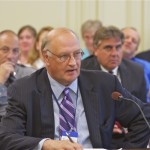Science and risk assessments done by the DWQI and DEP scientists have HUGE impacts on public health and the environment, as well as industry compliance costs
Christie DEP Working With Industry to Block Costly Protections
[Important Updates with news coverage below]
Unfortunately, that headline is not a rhetorical question.
Tomorrow in Trenton, the Assembly Environment Committee will hear a bill, A2123 (Burzichelli, D-Gloucester) that would do just that.
The bill was initiated by the NJ Chemistry Council and is supported by the Governor’s Office. DEP was told to get in line and will not oppose it.
Burzichelli serves on Gov. Christie’s “Red Tape Commission” as the legislative point man for the Governor’s “regulatory relief” and “Red Tape” policy initiatives designed to roll back NJ’s tough standards to federal minimums and block the DEP from developing any additional new regulatory protections of public health and the environment.
The bill would do 2 really bad things:
- add 3 industry members to the NJ Drinking Water Quality Institute (DWQI), allowing industry to have a formal role in setting NJ’s drinking water standards;
- revise the procedures and substantive requirements for how DEP conducts chemical risk assessments. The procedural changes would delay and provide additional industry control over risk assessments. The substantive changes would block consideration of thousands of valid, high quality scientific studies on the health effects of chemicals from being considered by DEP in a risk assessment.
Putting 3 industry representatives on the DWQI is a huge conflict of interest, because industry is directly regulated by the DEP standards recommended by the DWQI and must spend billions of dollars to comply with those DEP regulations.
Obviously, industry has huge economic stakes in derailing, delaying and weakening any DEP standards and those conflicts should disqualify them from any scientific credibility or formal regulatory role on the DWQI.
The bill furthers the chemical industry’s strategy to manufacture uncertainty to block, delay, and weaken environmental and public health regulations – for an outstanding in depth analysis of how the chemical industry has distorted science, see Professor David Michael’s recent book Doubt is Their Product – How Industry’s Assault on Science Threatens Your Health. The book has numerous NJ specific examples, especially on chromium and the shameful history of Dupont, a major player in NJ.
The DWQI was created by the Legislature in the 1983 Safe Drinking Water Act and is responsible for reviewing the science, conducting risk assessments, and recommending drinking water standards for adoption by DEP. DEP relies on the DWQI for the scientific basis for “Maximum Contaminant Levels” (MCLs) – or drinking water standards, based on an individual cancer risk of 1 in a million.
When DEP adopts a MCL drinking water standard and the risk assessment upon which it is based, the groundwater standards are automatically revised as well.
New drinking water MCLs, chemical risk assessments, and groundwater standards in turn have direct impacts on not only drinking water, but on surface water quality standards, soil cleanup standards, toxic site remediation requirements, and – depending on the chemical, air pollution control requirements.
Thus, the science and risk assessments done by the DWQI and DEP staff have HUGE impacts on public health and the environment, as well as industry compliance costs.
But the DWQI has not met in over 2 years. There is a huge backlog of recommendations by the DWQI to update and strengthen drinking water standards – those recommendations have been ignored by DEP.
 DEP Commissioner Martin has blocked the DWQI from meeting.
DEP Commissioner Martin has blocked the DWQI from meeting.
In another move to retaliate against the DWQI, Martin demoted and transferred the head of the Health Effects Subcommittee that adopted the risk assessments and developed MCL recommendations.
The former Chairman of the DWQI resigned in protest of DEP’s refusal to act on the DWQI’s recommendations. Amazingly, former Chair Mark Robson stated his frustration with DEP’s failure to adopt DWQI recommendations as his reason for leaving in an NJN TV interview (see:
- Total Collapse at NJ Drinking Water Quality Institute
- Running the Regulatory Gauntlet – A Dispatch from the Weeds
So, that is the outrageous context for this outrageous bill.
[Updates:
- NJ Spotlight story: Expanded Role for Industry Doesn’t Hold Water with Environmentalists
- Philadelphia Inquirer story: NJ bill could change regulation of drinking water contaminants
- Dems Do Christie’s Dirty Business For Him
- Chemical Industry’s War on Science Gains Support of Christie’s DEP
- Chemical Industry’s War on Science and Public Health (Part 2)
- Delaware Riverkeeper’s webpage on DWQI- see letters to DEP, et al
- Assemblyman Burzichelli Pulls Bait and Switch on Chemical Industry Drinking Water Bill
- Op-ed: Don’t pollute, dilute N.J. drinking water panel



Pingback: WolfeNotes.com » NJ Drinking Water Institute Reconvenes After Spending Nearly 4 Years Banished to the Christie Regulatory Wilderness
Pingback: Dusty
Pingback: Filter Cloth
Pingback: FRP Production Machinery
Pingback: Acrylic Acid
Pingback: Petroleum resin
Pingback: Methoxyfenozide
Pingback: WolfeNotes.com » EPA Science Advisory Board Criticizes EPA Fracking Finding On “No Widespread Impacts”
Pingback: WolfeNotes.com » The Exxon PlayBook Has Been Deployed In NJ For Decades